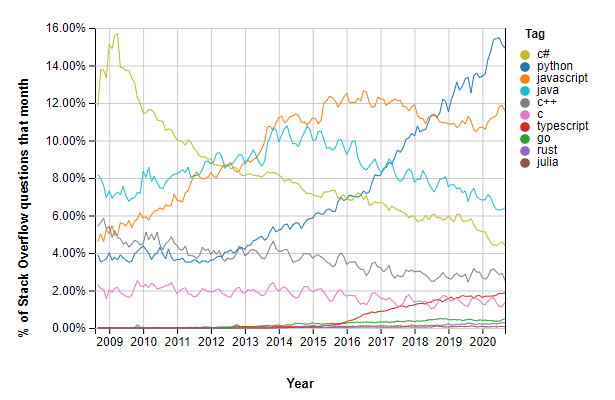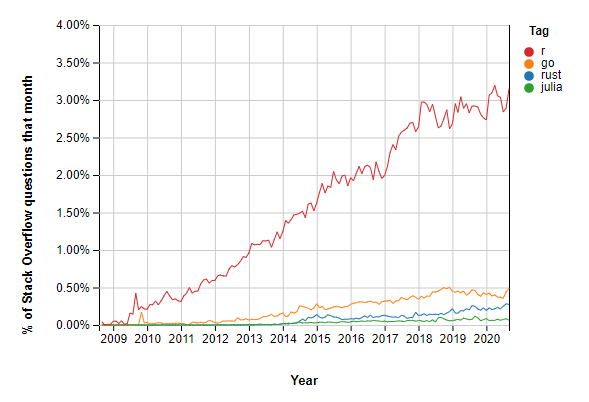Nothing is eternal in this world of the living. Everything has an expiry date, even for programming languages. Right now, Python is the big fish in the market. According to many surveys, Python is one of the most widely used programming languages of 2015. In addition to being simple and easy-to-learn, Python enables developers to express concepts without writing longer code lines. The language has undergone a drastic change since its release 25 years ago, as many add-on features are introduced.
But Python, like other programming languages, has several shortcomings. Programmers need to know some of Python programming language's major limitations, which can be overtaken by other programming languages. Let's find out.
Why Python popular 😍
According to StackOverflow 2020 survey, python is one of the most wanted languages. Around 30% of developers want to develop something by using it. Also, 66.7% of developers love the Python programming language. Python’s success is reflected in the Stack Overflow trends, which measure tags in posts on the platform.
Here is another survey result from TIOBE Index for python.
As a programming language, the features of Python brought to the table are many. Some of the most significant features of Python that makes it so trendy:
- Easy to learn
- Readability
- Memory Management
- Object-Oriented
- Exception Handling
Limitation of Python ⚠️
Python has varied advantageous features, and programmers prefer this language to other programming languages because it is easy to learn and code. But like every technology, Python has its weaknesses. I will go through the most important flaws, one by one, and assess whether these are fatal or not.
⭕ Speed
Python is slow. It takes a longer time to execute a task compared to other languages like C, C++. Python executes with an interpreter's help instead of a compiler, which causes it to slow down because compilation and execution help it work normally.
⭕ Run-time Errors
The Python language is dynamically typed, so it has many design restrictions that are reported by some Python developers. It is even seen that it requires more testing time, and the errors show up when the applications are finally run.
⭕ Mobile Development
Python wasn't made with mobile in mind. Developers cannot use python directly for developing mobile apps by targeting any popular mobile platforms. They have to use frameworks like Kivy to build cross-platform mobile apps using Python.
⭕ Lack of Modules support
A large and active community supports Python. The Python community members regularly share new packages or modules to make it easier for programmers to add functionality to the application. But developers often complain that the quality of individual Python modules or packages differs. Some of these packages lack adequate support and are not updated regularly.
⭕ Depends on Third-Party Frameworks and Libraries
Python lacks several features provided by other modern programming languages. So the programmers have to use some third-party frameworks and tools to build web applications and mobile apps in Python.
Overtaken by other languages 🔄
There are a few competitors on the marker of programming languages:
💠 R
R possesses an extensive catalog of statistical and graphical methods. It includes machine learning algorithms, linear regression, time series, statistical inference, to name a few. It is one of the most popular languages used by statisticians, data analysts, researchers, and marketers to retrieve, clean, analyze, visualize, and present data.
💠 Rust
Rust is a modern programming language focused on memory safety and performance. There is no virtual machine, garbage collection, or other fluff, which you will find in higher-level languages. Rust primarily aims to solve a lot of the issues which C/C++ programmers face frequently.
💠 Go
Go language is an effort to combine the ease of programming of an interpreted, dynamically typed language with the efficiency and safety of a statically typed, compiled language. It also aims to be modern, with support for networked and multicore computing.
💠 Julia
Julia is a high-level, high-performance, dynamic programming language. While it is a general-purpose language and can be used to write any application, many of its features are well-suited for numerical analysis and computational science. Julia aims to create an unprecedented combination of ease-of-use, power, and efficiency in a single language.
Conclusion 👌
Given the ubiquitous popularity of Python at the moment, it will surely take half a decade, maybe even a whole, for any of these new languages to replace it.
🚩👉 If it was useful to you, please Like/Share to reach others as well. I talk about web development and UI design on Twitter @kmhmubin, come to talk with me there!
The cover image is an improvisation on top of the work from Unsplash 💖











Top comments (0)